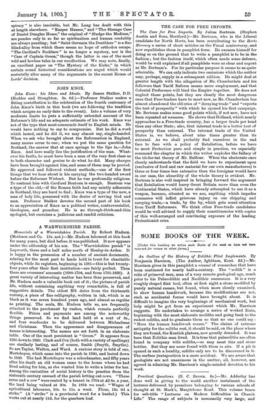The Case for Pres. Imports. By Julius Bertram. (Stephen Austin
and Sons, Hertford.)—Mr. Bertram, who is the Liberal candidate for North Herta, has been contributing to the Hertz Mercury a series of short articles on the Fiscal controversy, and now republishes them in pamphlet form. He excuses himself for doing so on the ground that to write a pamphlet is to be in the fashion ; but the fashion itself, which often needs some defense, would be well explained if all pamphlets were as clear and cogent as Mr. Bertram's. For its particular purpose it seems to us quite admirable. We can only indicate two omissions which the author may, perhaps, supply in a subsequent edition. He might deal at greater length with the allegation of Mr. Chamberlain and his followers that Tariff Reform means more employment, and that Colonial Preference will bind the Empire together. He does not neglect these points, but they are clearly the most dangerous ones that Free-traders have to meet now, as Mr. Chamberlain has almost abandoned the old cries of " decaying trade " and " exports the test of prosperity" with which he opened his first campaign. Mr. Bertram makes some good points which, if not new, have not been repeated ad nauseam. He shows that Holland, which nearly approaches to a Free-trade country, has a larger trade per head than any other State; also, that internal trade is a better test of prosperity than external. The internal trade of the United States is, we believe, about nine times greater than its external. As we shall probably find ourselves in the end face to face with a policy of Retaliation, before we have to meet Protection pure and simple in practice, we especially commend the chapter in which the writer explodes the fallacy of the tit-for-tat theory of Mr. Balfour. When the • electorate once clearly understands that the field we have to experiment upon (exclusive of food and raw material for our own manufactures) is three or four times less extensive than the foreigner would have in our case, the absurdity of the whole theory is evident. Mr. Bertram is also well inspired in bringing forward the argument that Retaliation would harry Great Britain more than even the Continental States, which have already attempted to use it as a weapon, because, situated as we are, anything which impedes commerce will inflict grievots injury on our shipping and carrying trade,—a trade, by the by, which gets scant attention from Tariff Reformers. We think other Free-trade candidates would be well advised to supply their constituencies with copies of this well-arranged and convincing exposure of the leading Protectionist cries.






































 Previous page
Previous page